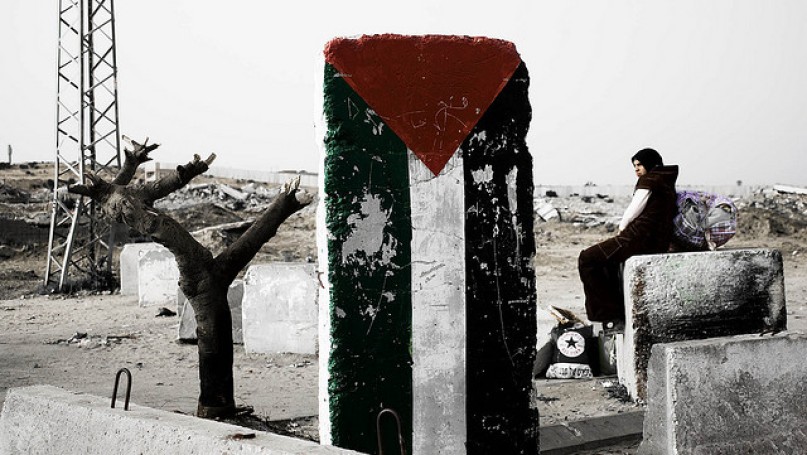
It is now a week since Israel launched “Operation Protective Edge”; in a statement on 8th July when the campaign began, Israeli Prime Minister Binyamin Netanyahu warned that it was time to “take off the gloves” in the battle against Hamas. The human cost of this robust approach is mounting daily. The UN Office for the Coordination of Humanitarian Affairs (OCHA) has estimated that (by 15:00 on 13th July) 168 Palestinians had been killed, 80% of which were civilians and 21% were children. As yet no Israeli’s have been killed though over thirty have been injured in what OCHA has described as “indiscriminate rocket firing” from inside Gaza. OCHA has amassed an array of grim statistics on life in Gaza; some 25,000 “traumatized children in Gaza are in need of psychosocial support”; 16,000 people are sheltering in UN Schools; 5,600 people have had their homes destroyed; 60,000 people are in need of emergency food assistance.
While the conflict has generated near blanket international media coverage it has been strangely ignored by the three most prominent and vociferous organisations established to promote the idea of “The Responsibility to Protect”, namely The International Coalition for the Responsibility to Protect (ICRtoP), the Global Centre for the Responsibility to Protect (GCR2P) and the Asia Pacific Centre for the Responsibility to Protect (APCR2P). These organisations are prolific users of social media and collectively aim to highlight situations where human rights violations are occurring, and engage in advocacy to help bring an end to (invariably) state sponsored oppression.
Since the operation began these groups have published myriad tweets, posts and articles – on issues ranging from the rights of women, the treatment of refugees, mass atrocity cries and the provision of medical aid – in a wide variety of crises including Yemen, Nigeria, Central African Republic, Mali, Iraq, Syria, Sudan, Democratic Republic of the Congo, Mexico, Kenya, South Sudan, Libya, Myanmar, Indonesia, Sri Lanka and Burundi. Yet, coverage of the crisis in Gaza has been negligible.
There is no mention of the situation in the ICRtoP’s “News Articles” or “Listserv” section or indeed anywhere on its website. Nor is it mentioned on its Facebook page. On July 7th ICRtoP published a tweet expressing concerns about Palestinian refugees in Syria and on the 10th July ICRtoP tweeted a link to a short article by FIDH which expressed concerns about the human suffering but which called on “the Israeli authorities and Palestinian armed groups to stop hostilities”. Likewise the GCR2P has yet to publish anything on its Facebook page about the situation in Gaza nor has it tweeted anything (though it did find time to tweet a congratulations to Germany – “an R2P Champion” – for winning the world cup). In his personal twitter account Executive Director Simon Adams has published two tweets both of which condemn “both sides” for their part in the crisis. The APCR2P has yet to publish anything on Tweeter or its website; likewise there is no mention of the conflict on its Facebook page.
There is no dearth of interest, coverage or facts about the situation in Gaza and the fact that these three organisations have chosen to essentially ignore the crisis – or mention it only in a way which suggests a parity of aggression by “both sides” – is, by any estimation, odd. That other crises of far less gravity have received attention further accentuates this incongruity; the APCR2P, for example, posted an article on class discrimination in Mexico on 11th July. Whatever the politics of the crisis the situation in Gaza certainly constitutes a case worthy of note for organisations purporting to be concerned with human rights violations and the plight of innocent civilians.
Specifically, the manner in which the IDF have targeted civilian populated areas is of grave concern. That the tactics of the IDF have been draconian seems incontrovertible; on Sunday, for example, via text message and leaflet drop, Israel warned people living in Beit Lahia and Attatra in Northern Gaza to leave there homes; the leaflets read, “Those who fail to comply with the instructions will endanger their lives and the lives of their families. Beware”. Some 100,000 people live in these towns.
The effectiveness of R2P advocacy groups ostensibly stems from their ability to generate international momentum behind a particular cause. This strategy is naturally said to have most leverage on democratic regimes who theoretically listen to public opinion, both domestic and international. Israel is a democracy and both the government and the society are fully integrated into the global communication system. The lack of any advocacy from the ICRtoP, GCR2P and APCR2P is, therefore, curious.
The mute reaction to date from these groups will surely further embolden those who consider R2P – and the human rights industry generally – to constitute a means by which “the West” interferes in the affairs of the developing world through the promotion of a discourse which selectively chooses human rights violators in a way which selectively coheres with the foreign policy agenda of Western states. That a number of these prominent R2P advocacy groups – the GCR2P and APCR2P in particular – are funded in large part by Western state donations will naturally further this suspicion.
Further Reading on E-International Relations
- The Gaza Crisis: Restrictions and Challenges to the Humanitarian Space in Gaza
- Thinking Global Podcast – Dov Waxman
- Non-State Power: The Case of Hamas
- Opinion – The West’s Approach to Gaza: A Self-Imposed Existential Crisis?
- Gaza First: The Centrality of Gaza in Israeli-Palestinian Conflict Resolution
- Reflecting on International Terrorism after the Hamas Attacks on Israel